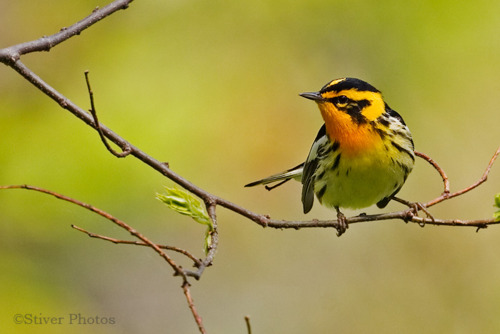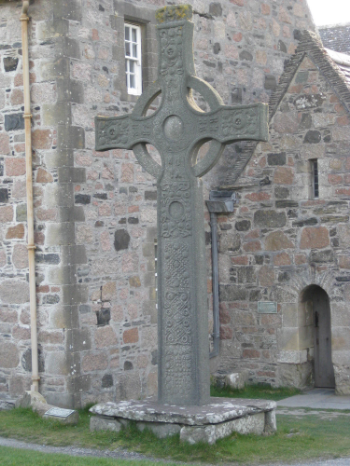In April 2010, I traveled to the Isle of Iona in Scotland. Like my recent trip to Israel, I went in search of something I couldn’t exactly name. I had heard a lot about the Abbey and knew many who had been there considered it a sacred place. I wanted to see for myself. I also knew the birding would be phenomenal. This was to be the first trip I had ever done on my own. Why this appealed to me then and why it still appeals now, I cannot say for sure. But it is deeply satisfying to strike out on one’s own to meet the unique and inherent challenges and blessings of travel.
Iona is a small and beautiful island in the Hebridean chain off the west coast of Scotland. And the first thing I’ll say about it is this: it was really, really hard to get there. It’s a seven hour journey from Glasgow to Iona, by bus, train, ferry, bus and ferry. It’s a pilgrimage in the true sense of the word. Strangely this made it all the more worthwhile. It was not easy and there’s something to be said for that. It was even harder to get home with a volcanic dust plume in my way.
On the third day of my visit, the volcano called “Eyjafjallajökull” erupted in Iceland and my return flight to the states was cancelled. I used most of the ₤20 in prepaid minutes on a disposable cell phone trying to get through to Continental Airlines. As the prepaid phone was dying, I powered on my own ATT phone to retrieve a friend’s number to send one last, SOS text message. To my amazement, my own phone had 5 bars. Glory! I used my cell phone a LOT after that. The bill was astronomical. Through this experience, I learned how extensive ATT’s cell coverage is and how expensive it can be. As impressive as these facts may be, I was also shown other things on Iona that were even bigger; things I could not get my mind around. Vast, unknowable things about God.
There is a Celtic saying that “heaven and earth are only three feet apart, but in the thin places of the world that distance is even smaller.” Iona is a thin place. I went there seeking a glimpse of the other side, but to my surprise and delight, the insights I gained were not about heaven, but about this side of the veil. I discovered that in a thin place you feel an energy that suggests there is more to the world than what our five senses can detect.
There are far more resident sheep on Iona than people, only about 125 people make their permanent home there. Thousands, like me have made the pilgrimage over the centuries. It is a uniquely beautiful place – just 1 mile wide and 3 miles long, with rolling hills, white beaches, pebbled coastlines, very cool birds, a sheep pasture that doubles as a golf course, and rocks. Lots and lots of rocks. And though I’m not a geologist, it was the rocks that first caught my attention. Maybe I should say, it was through the rocks that God first caught my attention.
Iona has some of the oldest exposed rock in the world. Geologists say the outcrops date back 2.7 billion years. They think the age of the Earth and the rest of the solar system is about 4.5 billion years – so you can start to get a feel for the age of it; more than half the age of the planet. The really old stone is called Lewisian Gneiss. I held a piece of it. 2.7 billion years old. Can you imagine? Holding something that old? I cannot wrap my mind around that. But after being there a while, on the island, I began to feel it. God, our God, who’s the same God today, as he was then, was active and creating 2.7 billions years ago in that very same spot.
It was Psalms that kept coming to mind while I was on Iona. The Psalms seem to me some of the most direct knowledge we have of God. God’s own Word revealing God’s own nature. We read the 46th Psalm the first night in worship at the Abbey. I distinctly remember hearing verse 10: “Be still and know that I am God.” And I thought, “Oh, I love that verse…” and then the thought was gone. I was on to the next thing. I wasn’t really listening. The next day, we sang that verse again in a song within the context of a prayer. I heard it a little louder that time. “Be still and know that I am God.” Again the third day, I heard it in another context. Later, when I learned my flight was cancelled, I opened the bible and turned to the 46 Psalm, and read it again. And I thought, “OK. I can be still here.” That’s when God showed me the rocks.
The 46th Psalm speaks of God’s permanence, God’s transcendence above the problems that confront us: “God is our refuge and strength, a very present help in trouble. Therefore we will not fear, though the earth should change, though the mountains shake in the heart of the sea; though its waters roar and foam, though the mountains tremble with its tumult…”
In fact, the mountain that shook and trembled this time was in Iceland. The unpronounceable volcano, while 685 miles north and west of Iona added to my experience of God. I couldn’t see the dust cloud, couldn’t smell it, taste it, or see it. Yet I knew it was there -- it cancelled my flight. It stranded me and millions of travelers and reeked general havoc on flight schedules in and out of Europe for about a week. A strange coincidence is that the Island of Mull, just a few hundred yards across the Sound of Iona, was largely formed by volcanoes about 60 million years ago – Mull is just a just baby compared to Iona, and a completely separate divine creative act. Had I left Iona when scheduled, it would not have been long enough. I was still in my normal, small-life operating mode…do as much as you can, see all there is to see, wear yourself out on vacation, and recover on the way home. That’s the way I traveled most of my life…I would often rush, literally run through museums and galleries in order to see more. I admired famous statues and landmarks from the car, instead of getting out to read the plaques. I like to go, go, go. So my first few days on Iona were filled with an almost frantic pace to worship as often as I could and to see as many birds as I could. Neither activity works particularly well at high speed. But in that long journey there, I realized that a full three days of my trip were taken up by travel. I would only have had four nights and three days on Iona if it weren’t for that volcano. I think it was my mom, who said to me on one of those very expensive international cell phone calls, “Well, God knew you needed a longer rest.” And when I hung up from talking to her, I thought, “God knew I needed a longer rest so he blew the top off a mountain in Iceland?” That doesn’t sound right.
When we grow mindful of the vast agelessness, power, and sheer magnitude of God, who are we that God cares for us? The psalms liken our life span to a flower or a blade of grass compared to the foundational rocks of Iona. Somehow, beyond our wisdom or knowledge, this vast, ageless, powerful God, the ruling power in the universe is for us. And as unlikely as it may be, the great big God I found on a 2.7 billion year old rock, cares for us.





